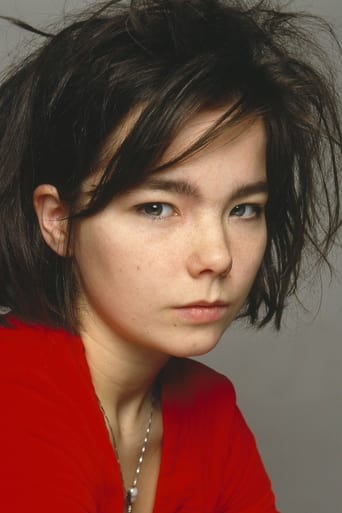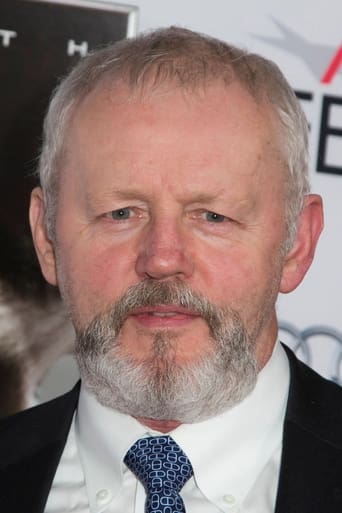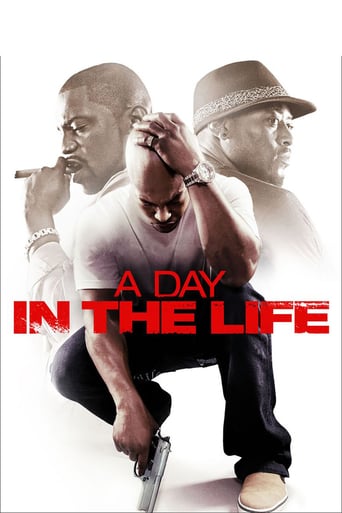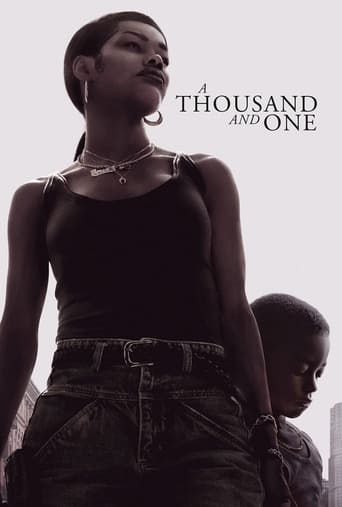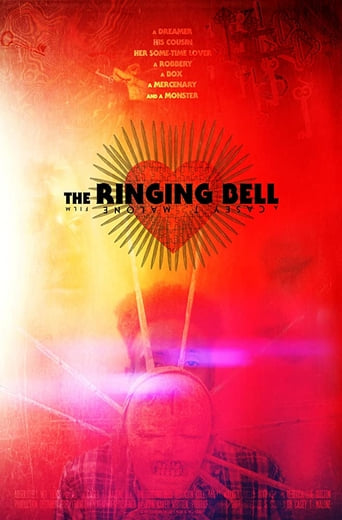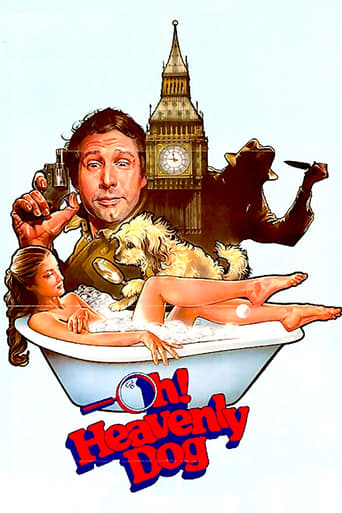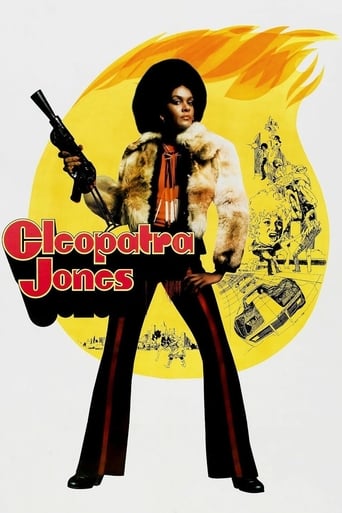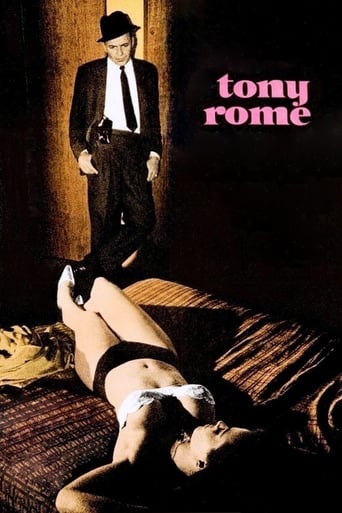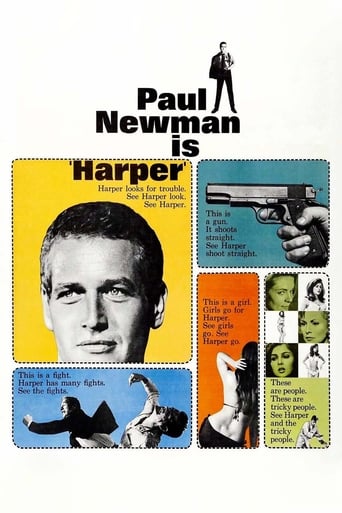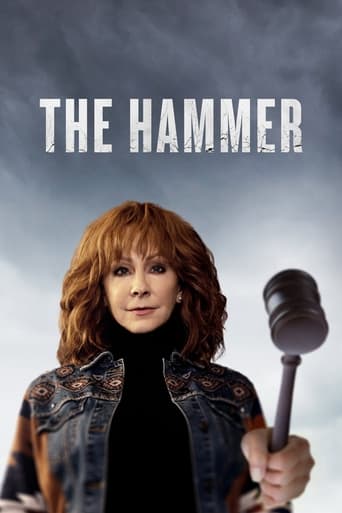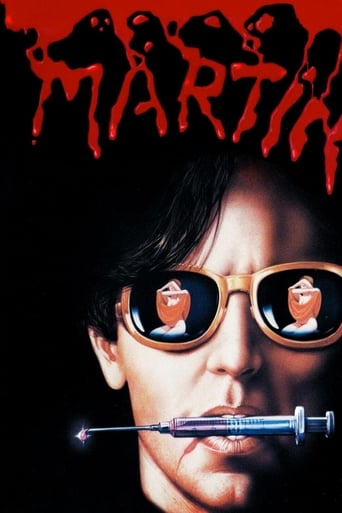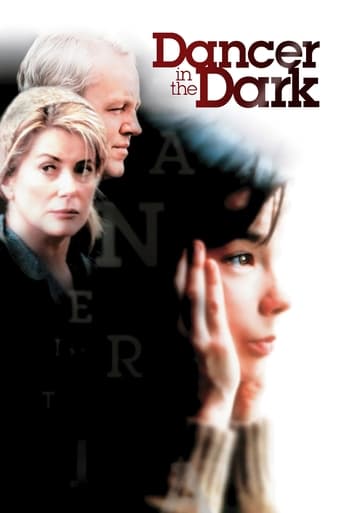
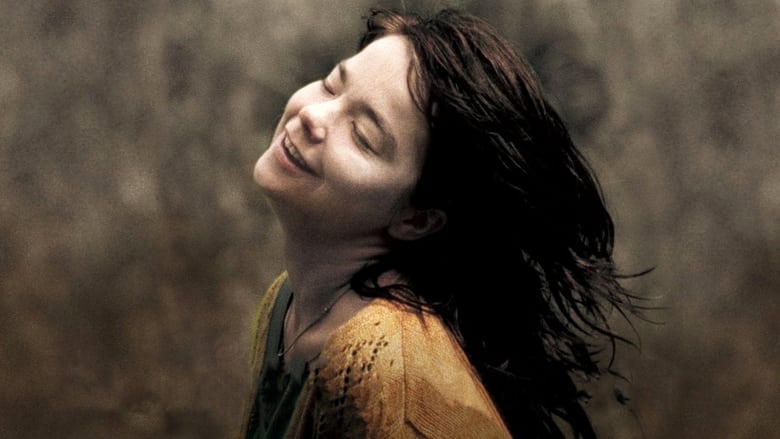
Dancer in the Dark (2000)
Selma, a Czech immigrant on the verge of blindness, struggles to make ends meet for herself and her son, who has inherited the same genetic disorder and will suffer the same fate without an expensive operation. When life gets too difficult, Selma learns to cope through her love of musicals, escaping life's troubles - even if just for a moment - by dreaming up little numbers to the rhythmic beats of her surroundings.
Watch Trailer
Cast
Similar titles
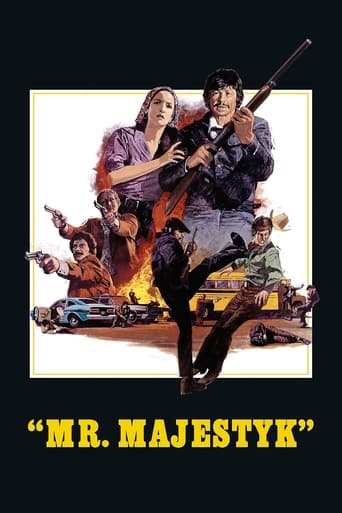
Reviews
You won't be disappointed!
The performances transcend the film's tropes, grounding it in characters that feel more complete than this subgenre often produces.
This is a small, humorous movie in some ways, but it has a huge heart. What a nice experience.
One of the most extraordinary films you will see this year. Take that as you want.
There's a few redeeming factors in this movie, mainly Bjork's musical numbers, although they can't seem to make up for the rest of the film. Lars Von Trier attempts to have poorly shot scenes to make some sort of artistic statement, regardless of if that statement means anything to you or not, you're still watching a poorly shot film. Bjork's musical talent simply does not do enough to carry almost two and a half hours of cinematic misery. This goes beyond simply being a sad story or a film that is difficult to watch, there's simply nothing engaging. I'm glad people something in Dancer and Lars Von Trier's other work, but I can't seem to find this film to be anything other than pretentious.
The films of Lars von Trier can be likened to a little boy with a stick. He pokes and prods at incapacitated wild animals, aiming to hurt and bring about squeals of pain, relishing in these reactions and putting off the mercy of death for curiosity's sake. Lars von Trier, of course, is not a little boy, and knows exactly what he is doing and the gravity of his actions. In Dancer in the Dark, his critique takes aim at American escapist musicals where the protagonists can whisk away their worries with a dance and song - in contrast, Selma is harshly jerked out of her percussive daydreams and brought back to reality. Selma is the dumb tortured animal is this scenario, so simple- minded, so incapable of self-pity, and perpetually detached from the life that she leads. So obviously she's a perfect tool for Trier, who blames anyone and everyone for her demise, offering little awareness of any cause and effect, or an escape route. She's a poor Czech immigrant toiling away in America, but that hardly even matters. For the wealth of sociopolitical issues to mine here the setting is made bare of any context. Trier improved on this in Dogville, which at least dropped Nicole Kidman into an allegorical capitalist society where she has to work for room and board. But here Trier wields his characters like dummies to be bashed and bashed for devastation's sake. Selma is offered no agency but continually assaulted by events far beyond her or the film's comprehension. She's little more than a child with initially wide eyes and pixie-ish features; she has a son of her own but no scene to present any notion of maturity, motherhood or devotion towards him, and keeps what little of her earned wages in a candy box like a little girl saving up pocket money. Björk, to her credit, is suitable, making a whole show of gradually squinting and retreating into her songs, but even she can't justify being this delightfully twee and naive in the face of impending doom. It's too easy of a target to shoulder the film's events, and it doesn't earn our sympathies so much as break down sobbing and begging for them. Arresting is one word that has been used to describe Trier's style. Another would be condescending, both towards his characters and audiences. He wields his cameras as if he was part of a hyperactive news crew at the scene of some devastating crime, and you can practically feel the nervy shakiness and excitement at being able to capture and profit from such misery. His clumsy, unstable zooms (that awful final shot of the glasses) intrude on the characters and their emotions, fetishising their fragility in suffocating extreme close- ups. These shots talk down to audiences, as if we could not sympathise unless the camera is thrust right into their faces and the punishment unrepealable. The musical sequences were filmed simultaneously with over a hundred DV cameras, and the drop in quality shows. Although some are inspired, making full use of the inventiveness of Selma's imagination and her child-like glee, floating in and out of reality, they are visually appalling. Perhaps it's Trier's Dogme 95 ties, preventing him from lighting the sequences with anything other than the dim, dusty overhead lights of the factory, rendering all the splashes of imaginary colour in the mise en scène depressingly drab. Or perhaps it's the fact that he continually cuts from dozens of different perspectives of his coverage, without any visible method in the madness but simply because the setup allows him that privilege. If it's supposed to be an attack on Hollywood's fondness with continuity editing it's another black mark for Trier: abrasive for abrasiveness' sake. The Dardenne brothers are a pair of recent filmmakers with similar stylistic goals, and who also focus on the plight of the lower class. But they are not nearly as condescending to their characters as Trier is, who saps Selma of all her dignity and turns her into a prop for an emotional beatdown. In her confrontation with Bill she turns into a hysterical and tragic mess, sobbing and fumbling blindly for the gun but only managing to wound him with the bullets. She then staggers around and finally finishes him off with the deposit box. The sheer absurdity of this scene (why not simply get a head start on the police instead of asking a blind girl to commit murder - and why does she look away and fire blindly instead of feeling for his head and shooting point blank) is coupled with Trier's persistence to lengthen it. He milks and milks the tragedy for all its worth, barreling the camera right into Selma's weeping face, and in the end it becomes hilarious in its ridiculousness. It's unbelievable that no one has turned this into a skit or gag: a lowly, suicidal man asks his friend to pull the trigger, only she's blind and has atrocious aim. He holds it up to his temple for her, she squeezes, and the vase on the shelf six feet to the right explodes. Above all, this is stylised realism, ironic for one of the founders of Dogme 95. He did this in Breaking the Waves too, transferring the film stock onto video and then back again for extra dose of graininess. In this bizarre scene the pair stumble and slip and fall all over the place, setting up additional opportunities for Trier to insert more misery. Just like Haneke gleefully claps his hands every time someone walks out of Funny Games, Trier is lapping up the tears born out of Dancer in the Dark.
Well, I'm not an especially big fan of the work of Lars Von Trier, and i had actually never listened to Bjork's music at all before this movie. Lars von Trier has just never impressed me as a filmmaker. I've always admired the visuals in his movie, like the opening of Melancholia and Antichrist, but none of the movies I had seen from him seemed to be anything special. Until I saw this movie. Now, I'm still not a Von Trier fanboy, but, goodness, I love this movie. It definitely is not for everyone. The style of the movie may be hard for some people to look past, and, admittedly, it was hard for me to digest for the first half-hour or so. But, after the first song "Cvalda", I was completely sold on this movie. I didn't even notice the grainy style of the old digital camera. It's a movie that is definitely more subtle than other Von Trier films. Now, it's not incredibly subtle, but there are some things I noticed the second time around that I didn't catch the first time. For example, during the song sequences, the colors are actually brighter and more vibrant, but it's almost invisible in a first viewing. At least, it was to me. I was raised on musicals, and this one does hold up in its own quirky way. The music is Bjork, and if you are familiar with her, then you will know what to expect. I didn't, and to hear music like this kind of took me aback. However, most of the singing is very good, and this movie completely sold me on Bjork's singing abilities, and I'm glad I was introduced to her through this movie. And, it is a very emotional movie. When it was over, me and my uncle (with whom I watched it with) just sat there in complete silence. Needless to say, the story and music and ending added up to make a fantastic movie. It was so impressive to me, that the very next day, I watched it again. The style is still somewhat odd to me, but it's grown on me. Not for everyone, but if want something that's experimental or emotional or both, check it out.
Okay is not a good word to describe this movie. It is not bland or mediocre; rather it dips into both Oscar and Razzy territory... a lot. Lets start off with the positives:Interesting camera style, which at first feels artsy-fartsy, but works surprisingly well (except for in above shots), and immerses you into this world as if you were an unnamed characterAMAZING acting from all of the supporting cast. Bjork's performance was inconsistent (I'll talk about that later), but everyone else in this film was very, very good I can actually follow what's going on! While I love movies like 2001 (very few artsy movies are actually good, but some are), they can be very, very, VERY abstract (sort of their draw too, I guess), but this one was easily followable, without shoving everything in the audiences face. Now for the shitstorm:The plot holes and technical inconsistencies. Maybe you can chock this up to my CinemaSins nature, but I can't stand plot holes and inconsistencies, especially when they are obvious. And this one has a lot. For example, when Bill first shows off his gun, it is a revolver, and when we see it again in the film later, it is an M1911. While both would make sense for a police officer of the time (which Bill is), he is explicitly mentioned as having only 1 gun, his standard issue police firearm, which is also a major plot point of the film. There are also tons of inconsistencies (this is DEFINITELY NOT THE 1960s, despite the film claiming it as so), like the model of train and SEVERAL background issues. If you nitpick a lot, then this film will give you headaches and nightmaresThe writing. I may have said that the acting was superb, but the writing isn't. While the plot itself was very good, it was just handled very poorly. A good script has a plot that revolves around the characters, and fits with those characters. When a character does something in a good script, it feels like THAT CHARACTER performed said action out of a reason befitting of them (I.E. The joker's seemingly random actions in the Dark Knight fit with his character very well). These characters feel like they do thing for the convenience of the plot, which breaks the immersion set up with the great acting and camera style. Selma's stupidity. Okay, this one goes into the last issue I mentioned. Selma's IQ is very low (not saying Bjork's necessarily is, but Selma the character is about as bright as nylon is flammable). She is SO STUPID!! This is HIGHLY immersion breaking, and she is a disillusion and (unintentionally) irresponsible mother at best, and and a (this segment has been censored due to explicit use of profanity and offensive language. We apologize for the inconvenience, and will now resume the review. Thank you!) at worst. The verdict:Good acting and well-done camera angels lead to superb immersion. Songs that are varied in how good or bad they are. A terrible script that breaks most of the immersion set up by point one. Blatant inconsistencies that break the remainder of immersion left after number three. A lot of unbelievable circumstances that the plot forces these characters into against any sort of believablity. Final word: A motherload of potential, thanks to great acting and superb camera-work, wasted almost entirely by an atrocious script and so many plot holes that it puts the moon to shame. A good, but forgettable soundtrack to boot. Ultimately: wasted potential; this story needs to be revisited by a writer who knows what the hell he's doing. -5.5/10-
